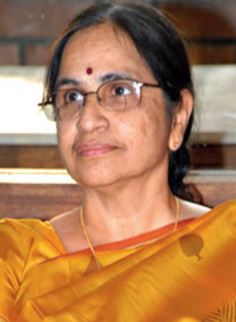
Haunting Voices: Heard and Unheard
Amulyam Story by Olga
-Syamala Kallury
Amulyam: Volga; A story published in Visalandhra Telugu Katha; 1910-2000. October 2002; Price Rs.400; Pages 1109
Grandmother: Hi Ravi, I am ready with today’s story. I have taken this story from the same book. As I told you in our previous story-telling, this book contains 108 stories and there is much to explore in here.
Ravi: I think someone should translate all these 108 stories into English so that people like me can read them all.
Grandmother: Yes, there’s an idea. But the better idea is to learn to read Telugu.
Ravi: Well, I might. Who knows? With our sessions getting more and more interesting like this, I might ask you to teach me how to read Telugu.
Grandmother: Alright then, let’s get down to business. Today it is another modern age story but placed in contrast to the traditional Indian values and how it might lead to conflicting situations at home for families. It touches upon howthese conflicts create generational gaps. The story is called Amulyam, which means priceless. Amulya is a young child through whose perspective the story is narrated. The author Volga is a well-known feminist writer in Telugu and she has won several accolades for her work, including Sahitya Academy award, for her progressive writing. Her real name is Lalitha Kumari.
This is how the story goes…that day when she got up, Amulya noticed that there is a suppressed excitement and unusual activity in the house. Her parents Subhadra, Narayana Rao and brother Jaswant got up early and were getting prepared for an important arrival of someone. She then remembered that her grandmother would be coming that day. Narayana Rao was asking his wife they should all go to the station to bring her as she would be coming with a lot of luggage and the sight of that luggage would surely upset him. If someone else was there to help it would not be so bad. His wife in turn says she would not like three people to go as three was considered an inauspicious number. Jaswant got ready to go with his father.
When she came grandmother came only with two old trunks and Narayana Rao was relieved. As soon as she reached home, she opened her trunk and gave her daughter-in-law ((who was also her niece), Subhadra the henna leaves she brought from their village home. She was happy to receive it for her daughter Amulya, though it was difficult to grind it to paste in her apartment. From the first day the incidents are woven very effectively and appropriately, and they highlight the difference between two generations. The changing times and lifestyle in urban locales made it impossible to follow some of the time-tested practices.
The author goes on to establish the differences in the perceptions of rural and urban India. While some of the aspects are related to the lifestyle changes and differences in the way things are perceived, others are related to the mindset of these two generations. Firstly, as the mother grinds henna leaves to paste and tries to collect the paste into a bowl when the grandmother points out that it should be collected in a coconut shell as it stays fresh in it. Where can they get it? Amulya who is in the habit collecting junk and trinkets brings out one from her tin box, which was actually an old discarded school box. She was happy she could provide one and so was the grandmother. She then shows her box to her grandmother and wins appreciation for her collection. In the next such incident, the grandmother takes out the seeds of various vegetables she grew in her fields at home. Most people in her village enjoyed the fruits of this yield and collected vegetables from their garden. She brought them to share these seeds with her son’s family. But they do not have space for planting them as they live in an apartment complex on an upper floor. They thought of taking them to a friend’s house and planting them in his backyard. But Narayana Rao did not get time to go over to their house. Fed up with his mother asking him repeatedly, he takes it once and puts it in a dust bin outside near the bus stand once he leaves the house. Amulya sees him doing it and collects it and puts it in her scrap box. She feels sad that her father was cheating her grandmother.
Subhadra, Amulya’s mother, used to have good rapport with her mother-in-law in the early days of her marriage. They used to play traditional games that women play in villages and enjoy together. Subhadra used to read her stories from her collection of books. Again, with the changing times grandmother finds that Subhadra constantly reads business and economic journals and both husband and wife are constantly engaged in planning how to invest their money. Other than those magazines, she did not find any fiction or other magazines in their house. It made her sad how they constantly think and talk of money. They show no inclination to talk to her. Once when their maid’s daughter fell sick, she asked Subhadra for money to take her to the hospital. She avoided giving it to her in the first instance and finally, the grandmother gave the maid the medicine she prepared at home with her indigenous knowledge. She offered it to give it Jaswant when he was sick. But they did not oblige her and admitted him in the hospital and after shelling down their hard-earned savings they brought him home. This upsets her. Now when she offered this to the maid, Subhadra who did not offer to help her initially called her and gave her money. She told the maid to throw the medicine her mother-in-law gave her as it may not be safe. The maid gives her child grandmother’s medicine for three days and she was cured. She kept the money Subhadra gave her. She revealed this to grandmother which made her happy and sad – happy that it was accepted by the maid and the efficacy of her medicine was proved whereas she was sad that her own blood refused to have faith in her goodwill. “Why would I give something that would kill the child?” she asks herself as Amulya consoles her grandmother. She decides to go back to her village and they all agree. As she was leaving Amulya gives her back the seeds she gave her father. She copied all her grandmother’s indigenous knowledge in her notebook.
Grandmother leaves with the reassurance her knowledge will remain in Amulya’s notebook and successive generations would have the recorded evidence. Her priceless knowledge was preserved by Amulya, her granddaughter. Was she happy? God knows! She still leaves her son’s house with a heavy heart.
*****

Syamala Kallury taught for over a decade and a half in the AP Govt colleges in Srikakulam and Visakhapatnam as Lecturer in English She moved to Delhi after marriage where she taught in Delhi University, and in the Department of Humanities and Social Sciences at IIT Delhi till 2011 She has two daughters Ahana and Kruttika, who live in UK and Dubai respectively. Currently she lives in Visakhapatman with her dog Subbu, a cocker spaniel. A bilingual writer and translator, Syamala authored many books. 1. Telugu Short Stories women’s Voices: An Inner Voyage(1930-2000) Asian Publication House (2001)2. Twentieth Century Telugu Poetry (2006) 3. Godavari Tales Viveka Foundation (2006) 4.స్వగతాలు (2009) 5. If you Want To be a Poet, Patridge India (2018) 6. కంచికి వెళ్లకూడని కథలు navachetana పబ్లిషర్స్ (2019) 7.భావవిహంగాలు Telugu translation of Tagore’ s Stray Birds (1988, 2019)8. Rajanigandha, translation of Papineni Sivasankar’s award winning poetry collection with the same title published by Sahitya Academy New Delare ఆ few of her పబ్లికేషన్స్ in addition to a number of academic articles
